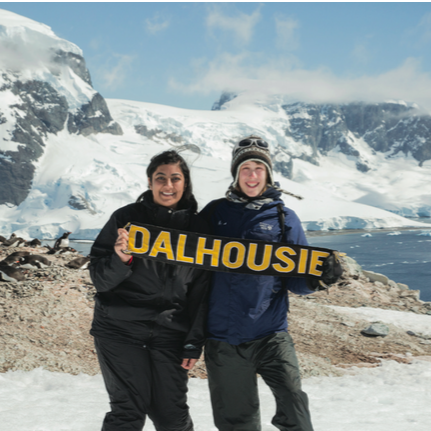
Dal students return from Antarctica
Two weeks in Antarctica provide insight on global warming, wildlife and the stench of penguins.
It is fairly rare for a student to say their winter break changed their life.
While most of Dalhousie was catching up on some much-needed rest and trying to stay out of the cold, two students were exploring Antarctica.
Jasveen Brar and Patrick Soprovich, both second year science students, participated in a two-week expedition with Students on Ice to Antarctica.
“When I first got back into Toronto, my Mom called and asked, ‘How was it,’ and I just cried. I couldn’t even put it into words,” says Brar.
As Brar and Soprovich recount their experiences in one of the most deserted corners of the world, both can’t help but smile.
“I remember coming out on zodiacs and the water was like liquid silver. It was so beautiful. That was where we saw our first penguins and seals … the penguins were quite comical in the way they walk around, but when they’re in the water they’re so graceful. They torpedo in and out of the water, ” says Soprovich.
Brar remembers the penguins not quite as fondly.
“Penguins smell. A lot. I think the first thing that really hit me was the smell of them, and how loud they are. But they’re so unique, and they have these amazing personalities about them.”
The students experienced nearly 24-hour daylight (December being summer in Antarctica) with the sun shining brightly when they went to sleep and when they woke up the next morning.
Sleeping onboard a ship and exploring Antarctica during the day also provided a break from one of the most prevalent aspects of modern life: the internet.
“Not having internet made us appreciate everything so much more. You would’ve missed something because you were on Facebook and it would be been really sad because you’re in such a unique place,” says Brar.
Recollecting their favorite moments of the trip, both Brar and Soprovich pause to reflect upon their sighting of a minke whale as they were leaving Antarctica.
“A minke whale followed us for almost two hours, it was like it was dancing with us. It would swim with us and then dive back down. It even surprised the expedition staff, since minke whales are usually quite shy.”
“I didn’t realize how alive the ocean is during Antarctica’s summer. We’d see a whale, we’d see birds, the whole place was just alive and that’s not really something that you think of Antarctica. You think of this desolate ice land, but it was really just full of life,” says Soprovich.
The expedition to Antarctica gave many opportunities for both students to learn about the profound impact that global warming has had on the region.
Inspired to help to create a change, Soprovich and Brar are part of a group of students from the expedition that are drafting a “Youth Declaration”, a document advocating for the protection of Antarctica’s Ross Ice Shelf.
Going back to class and once again falling into the routines of university life could make a trip to Antarctica seem very far away, but both Brar and Soprovich insist this is not something they will be forgetting any time soon.
“I know that I’m taking this experience forward and it will be a part of my life from now on. If any student can get involved with this they absolutely should,” says Soprovich.






